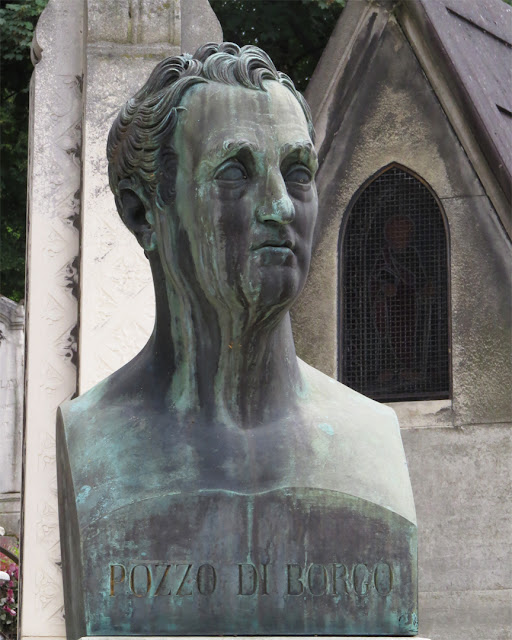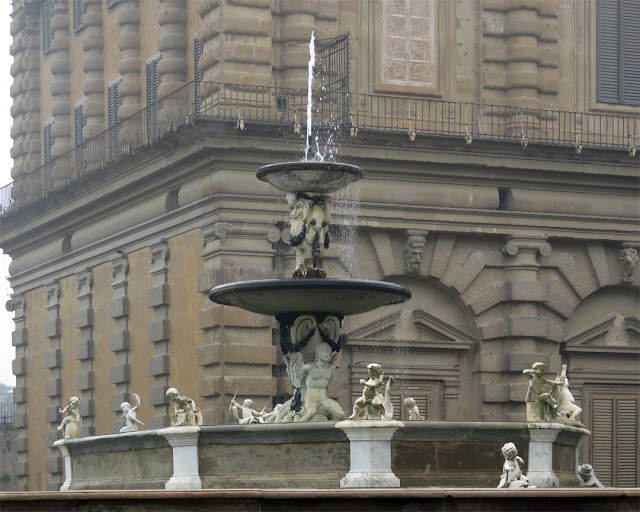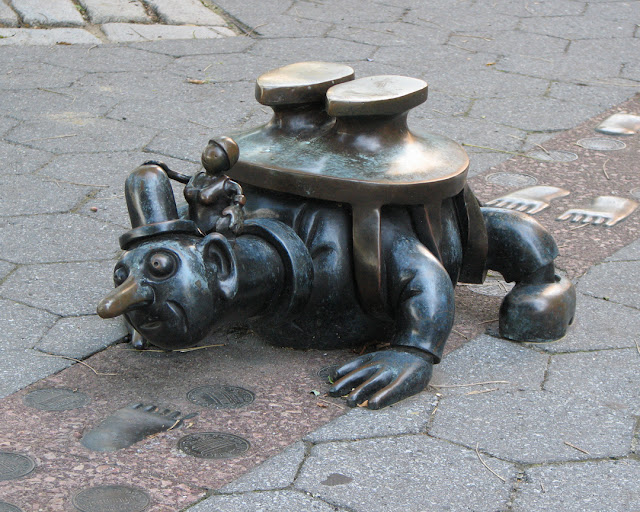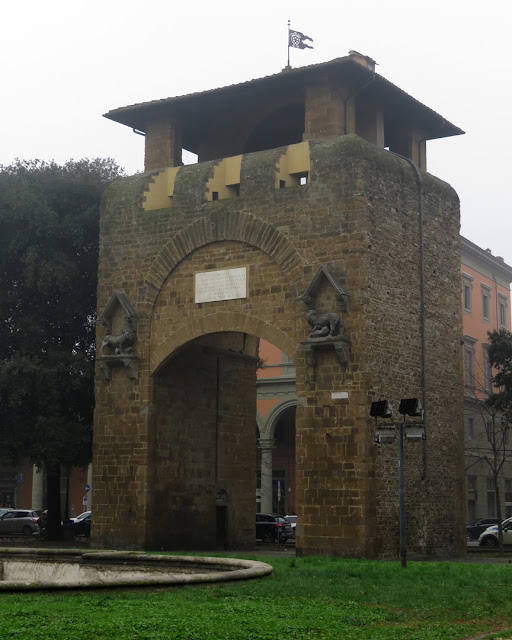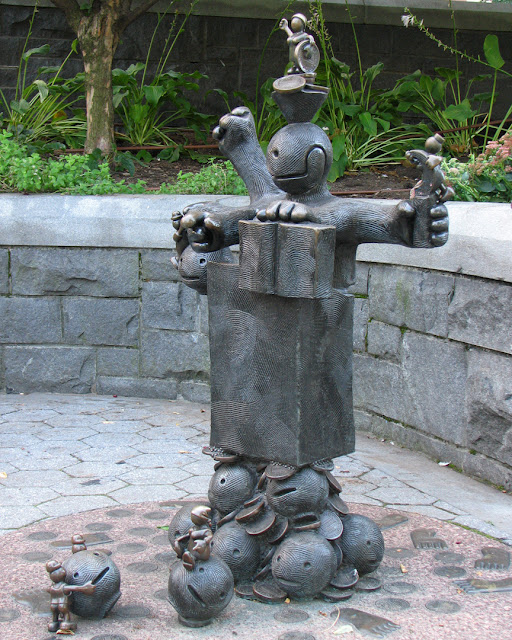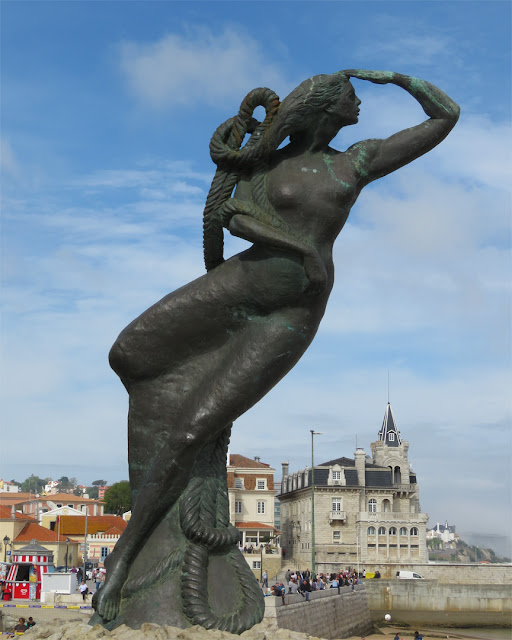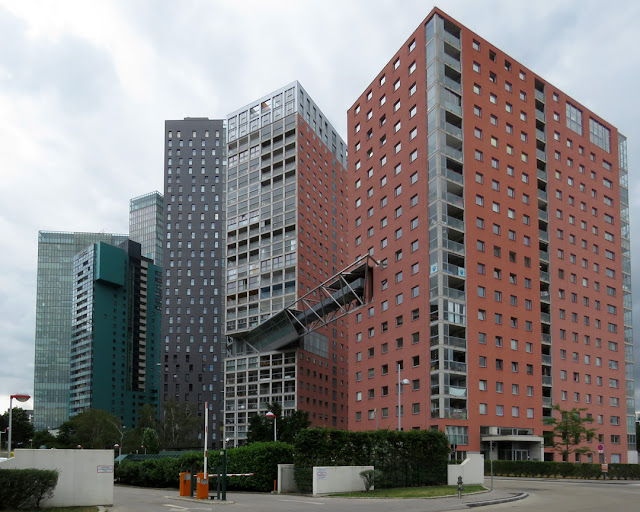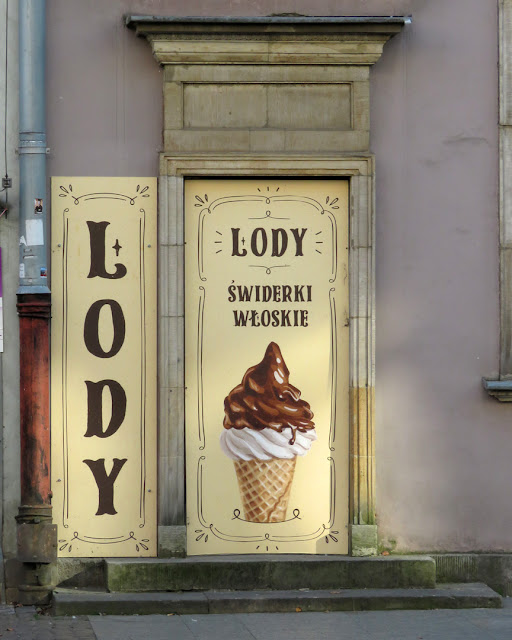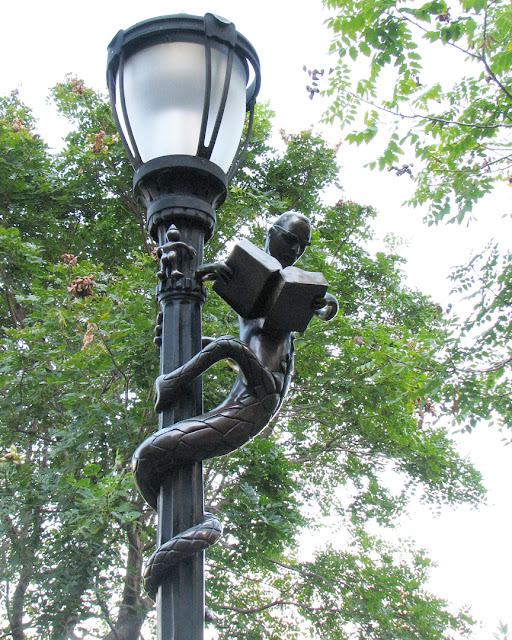Wednesday, September 30, 2020
Piazza Pietro D'Illiria
Fountain by Giacomo della Porta, 1593
Giardino degli aranci (Orange Trees Garden)
Piazza Pietro D'Illiria
Rome, September 2019
“The fountain at the entrance in Piazza Pietro D'Illiria is made up of two separate pieces: a Roman thermal bath, and a monumental marble mask originally carved to adorn a fountain built in 1593 by Giacomo della Porta for a cattle market (Campo Vaccino) in the centre of Rome. The mask has a long history. After the dismantling in 1816 of the Campo Vaccino fountain, it was recovered and from 1827 used to decorate a fountain erected on the right bank of the Tiber. This fountain was demolished in 1890 and the sculpture was kept in municipal warehouses until being moved to its present location.” (Orange Garden, Wikipedia)
Tuesday, September 29, 2020
Monday, September 28, 2020
Carlo Andrea Pozzo di Borgo
Grave of Carlo Andrea Pozzo di Borgo (1764–1842)
Cimetière du Père-Lachaise, (Père Lachaise Cemetery)
Quartier du Père-Lachaise, 20th arrondissement
Paris, July 2014
“Count Carlo Andrea Pozzo di Borgo (French: Charles-André Pozzo de Borgo, Russian: Карл Осипович Поццо ди Борго, Karl Osipovich Potso di Borgo; 8 March 1764 – 15 February 1842) was a Corsican politician, who later became a Russian diplomat. He was an official representative of his homeland in Paris before entering the Russian diplomatic service. His life was dominated by opposition to Napoleon Bonaparte, driven by a life-long hatred of him from an early age, considering him a traitor.” (Carlo Andrea Pozzo di Borgo, Wikipedia)
Sunday, September 27, 2020
Fontana del Carciofo
Fontana del Carciofo (Fountain of the Artichoke) by Francesco Susini, 1639
Palazzo Pitti
Florence, January 2020
“Once inside the main entrance of Pitti Palace, one passes through the wide Ammannati courtyard, closed off on three sides by the inner façades of the building and on the fourth by a single storey topped by the Artichoke Fountain (Fontana del Carciofo, 1639-41), the work of Francesco Susini.” (Pitti Palace - The Official Guide, Marco Chiarini)
Saturday, September 26, 2020
Friday, September 25, 2020
Dar Pomorza
“Dar Pomorza” (Gift of Pomerania)
Nabrzeże Pomorskie
aleja Jana Pawła II
Gdynia, September 2018
“The Dar Pomorza (Gift of Pomerania) is a Polish full-rigged sailing ship built in 1909 which is preserved in Gdynia as a museum ship. She has served as a sail training ship in Germany, France, and Poland. Dar Pomorza won the Cutty Sark Trophy in 1980.The ship was built in 1909 by Blohm & Voss and dedicated in 1910 by Deutscher Schulschiff-Verein as the German training ship Prinzess Eitel Friedrich, named for Duchess Sophia Charlotte of Oldenburg, wife of Prince Eitel Friedrich of Prussia. Her yard no. was 202, her hull was launched on 12 October 1909. In 1920, following World War I, the ship was taken as war-reparations by Great Britain, then brought to France, where she was assigned to the seamen's school at St-Nazaire under the name Colbert. The ship was in 1927 given to Baron de Forrest as compensation for the loss of a sailing yacht. Due to the high costs of refurbishing the ship, she was sold in 1929. Since 27 May 1983 she has been a museum ship in Gdynia (next to the Błyskawica). She is part of collection of National Maritime Museum in Gdańsk. In October 2009 the Dar Pomorza celebrated her 100th ‘birthday’. The celebration included her second christening by Mrs. Barbara Szczurek, the wife of the Mayor of Gdynia. Her speed under sail averaged 5 knots, with a 17 knots maximum. Her auxiliary engine was one of the type used in German U-Boats, and her horn, installed after the war, was from the German battle-cruiser Gneisenau, scuttled on 27/28 March 1945 at one of the entrances to the harbour of Gdynia.” (Dar Pomorza, Wikipedia)
Thursday, September 24, 2020
Santa Sabina
Basilica of Saint Sabina
Piazza Pietro d'Illiria
Rome, September 2019
“The Basilica of Saint Sabina is a historic church on the Aventine Hill in Rome, Italy. It is a titular minor basilica and mother church of the Roman Catholic Order of Preachers, better known as the Dominicans. Santa Sabina is perched high above the Tiber river to the north and the Circus Maximus to the east. It is next to the small public park of Giardino degli Aranci (Garden of Oranges), which has a scenic terrace overlooking Rome. It is a short distance from the headquarters of the Knights of Malta. Santa Sabina is the oldest extant Roman basilica in Rome that preserves its original colonnaded rectangular plan and architectural style. Its decorations have been restored to their original restrained design. Other basilicas, such as Santa Maria Maggiore, are often heavily and gaudily decorated. Because of its simplicity, the Santa Sabina represents the crossover from a roofed Roman forum to the churches of Christendom. It is especially famous for its 5th-century carved wood doors, with a cycle of Christian scenes (18 now remaining) that is one of the earliest to survive.” (Santa Sabina, Wikipedia)
Wednesday, September 23, 2020
Tuesday, September 22, 2020
Monday, September 21, 2020
Porta San Gallo
Porta San Gallo
Gate of San Gallo
Piazza della Libertà
Florence, January 2020
“This gate is located in the south part of the busy Piazza della Libertà, facing the imposing Triumphal Arch of the Lorraine. The construction of the gate began in 1285, as shown by an inscription, and the keys are today conserved in the Florence Historical and Topographical Museum.” (The doors of Florence, VisitTuscany)
Sunday, September 20, 2020
Saturday, September 19, 2020
Friday, September 18, 2020
Thursday, September 17, 2020
Descobrimentos Portugueses
Monumento aos Descobrimentos Portugueses
(Monument to the Portuguese Discoveries) by João de Sousa Araújo, 1992
Avenida Dom Carlos I
Cascais, April 2019
Wednesday, September 16, 2020
Wienerberg City
Wohnturm Monte Verde, 2004
Delugan-Meissl-Tower, 2005
Mischek-Coop-Tower, 2004
Wienerberg City, Favoriten
Vienna, June 2018
Tuesday, September 15, 2020
Triumphal Arch of the Lorraine
Triumphal Arch of the Lorraine by Jean-Nicolas Jadot, 1737
Piazza della Libertà
Florence, January 2020
“The arch has emanated a foreign aura even since its erection in 1737-1739 by the newly-arrived French architect, Jean Nicolas Jadot, to welcome the arrival (or visit) of the new ruler Francis Stephen, former Duke of Lorraine. Some sources add the efforts of Francesco Schamant of Lorraine to the design. The statuary was not added until 1744. However, many ephemeral decorations including tapestries were used along Via San Gallo to welcome the ruler in January 1739. This new duke's stay in Florence was short lived as he quickly moved Vienna to become emperor. The next duke, Francis' second son, Viennese-born Leopold, would not be named duke until 1765, when he moved to Florence with his Spanish-born wife.” (Triumphal Arch of the Lorraine, Wikipedia)
Monday, September 14, 2020
Sunday, September 13, 2020
Anatole de La Forge
Grave of Anatole de La Forge (1820-1892) by Louis-Ernest Barrias
Cimetière du Père-Lachaise, (Père Lachaise Cemetery)
Quartier du Père-Lachaise, 20th arrondissement
Paris, July 2014
Saturday, September 12, 2020
Circus Maximus
Circus Maximus
Via del Circo Massimo
Rome, September 2019
“The Circus Maximus (Latin for greatest or largest circus) is an ancient Roman chariot-racing stadium and mass entertainment venue in Rome, Italy. In the valley between the Aventine and Palatine hills, it was the first and largest stadium in ancient Rome and its later Empire. It measured 621 m (2,037 ft) in length and 118 m (387 ft) in width and could accommodate over 150,000 spectators. In its fully developed form, it became the model for circuses throughout the Roman Empire. The site is now a public park.” (Circus Maximus, Wikipedia)
Friday, September 11, 2020
Thursday, September 10, 2020
Neptunbrunnen
Sculptural group by Wilhelm Beyer
Neptunbrunnen (Neptune Fountain)
Schönbrunn Palace gardens
Schönbrunner Schloßstraße
Vienna, June 2018
Wednesday, September 9, 2020
Madonna della Tosse
Chiesa della Madonna della Tosse
(Church of Our Lady of the Cough)
Via Pascoli
Florence, January 2020
Tuesday, September 8, 2020
Monday, September 7, 2020
Lody świderki włoskie
Lody świderki włoskie (‘twisted’ Italian ice cream)
Długa
Stare Miasto (Old Town)
Gdańsk, September 2018
Sunday, September 6, 2020
Santi Cosma e Damiano
Basilica of Santi Cosma e Damiano
Via dei Fori Imperiali
Rome, September 2019
“A new entrance was opened on the opposite side (on via dei Fori Imperiali), whose arch gives access to the cloister, and through this to the side of the basilica. Next to the new entrance to the complex, there are the rooms with the original marble paving of the Forum of Peace, and the wall where the 150 marble slabs of the Forma Urbis Romae were hung. Through the cloister, the entrance to the church opens on the side of the single nave. The plan of the basilica followed the norms of the Counter-Reformation: a single nave, with three chapels per side, and the big apse, which now looks quite oversized because of the reduction in height of the 17th-century restoration, framed by the triumphal arch, also mutilated by that restoration. The mosaics are masterpieces of 6th- and 7th-century art. In the middle is Christ, with Saint Peter presenting Saint Cosmas and Saint Theodorus (right), and Saint Paul presenting Saint Damian and Pope Felix IV; the latter holds a model of the church.” (Santi Cosma e Damiano, Wikipedia)
Saturday, September 5, 2020
Friday, September 4, 2020
Thursday, September 3, 2020
Lungarno degli Acciaiuoli
Lungarno degli Acciaiuoli
Florence, January 2020
“On May 26, 2016, plans were announced to redevelop lungarno Acciaiuoli, which runs between the Ponte Vecchio and Ponte Santa Trinita. The city intends to restore the popular promenade to its former glory thanks to a 1 million euro investment with a total of 350,000 euro donated by Lungarno Alberghi Srl, the Ferragamo family hotel and hospitality chain, and financial services company Palazzo Feroni Finanziaria. Utility companies Publiacqua S.p.A., Toscana Energia S.p.A., Telecom S.p.A. and SILFI S.p.A. will invest approximately 750,000 euro in the urban renewal project. In its heyday back in the nineteenth century, the walkway was paved in stone. This project will replace the current asphalt with pietra forte, a type of sandstone mixed with reinforced concrete, the same used in via Tornabuoni. The footpaths will be widened, while space will remain for taxis and disabled access.” (The all-new lungarno Acciaiuoli, The Florentine)
Wednesday, September 2, 2020
Tuesday, September 1, 2020
Subscribe to:
Comments (Atom)



